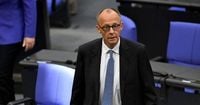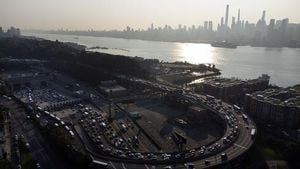In a stunning turn of events, Friedrich Merz, the leader of the Christian Democratic Union (CDU), failed to secure the position of Chancellor of Germany on May 6, 2025, during the first round of voting in the Bundestag. This unprecedented outcome shocked many, as Merz had been expected to receive sufficient support from both his party and the Social Democrats (SPD) to secure the chancellorship without the need for a second round.
Merz garnered only 310 votes out of 621 cast, falling short of the 316 votes required for election. The Bundestag, which consists of 630 deputies, witnessed 307 votes against him, with three abstentions and one invalid vote. This failure marks the first time in post-war German history that a chancellor candidate has been unable to be elected in the initial round.
Despite the setback, Merz will have another opportunity to secure the chancellorship in a second round of voting, which must occur within fourteen days. If he fails to achieve an absolute majority again, a relative majority will suffice for him to assume office. The CDU, along with its coalition partners, holds a total of 328 votes in the new Bundestag, but it is clear that some members did not support Merz in this critical vote.
Carsten Linnemann, the CDU's secretary general, expressed hope for a swift second round, stating, "I hope we will have a chancellor named Friedrich Merz tonight." However, the timing of the second vote is uncertain, with reports suggesting it could be postponed until later in the week.
The political landscape is further complicated by the reaction from the far-right Alternative for Germany (AfD) party, which has called for new legislative elections following Merz's failure. Alice Weidel, co-leader of the AfD, stated, "We are ready to assume governmental responsibility... Mr. Merz should resign immediately." This assertion underscores the growing strength of the AfD, which finished second in the February 23 elections and is now polling neck-and-neck with the CDU.
Merz's position is precarious, particularly as he faces significant challenges in leading Germany at a time of geopolitical uncertainty. The country is grappling with the aftermath of the Ukraine war, which has altered its military and diplomatic stance, and it has been economically stagnant since 2018. Critics within his own party have also questioned his recent decisions to relax strict public deficit rules to fund military rearmament and modernization efforts.
In the wake of the vote, reactions from various political figures have highlighted the fragility of Merz's coalition. Renate Künast, a member of the Green Party, described the situation as a "thunderclap for the entire country." She noted that the failure to elect Merz reflects the weak foundations of the coalition government.
The CDU had hoped for a smooth transition of power following their victory in the February elections, where they had campaigned on a platform promising to get "Germany back on track." However, this initial failure has raised doubts about Merz's ability to lead effectively.
As the political drama unfolds, all eyes will be on the Bundestag to see if Merz can rally support for the upcoming vote. His ability to secure the chancellorship will not only affect Germany's domestic policies but also its role in European and global affairs, particularly as the continent seeks to navigate a more independent path from the United States.
In conclusion, the political landscape in Germany is in flux. With the CDU and SPD holding a slim majority, the next steps taken by Merz and his coalition partners will be crucial in determining the future direction of the country. The pressure is on for Merz to solidify his leadership and address the pressing issues facing Germany today.






